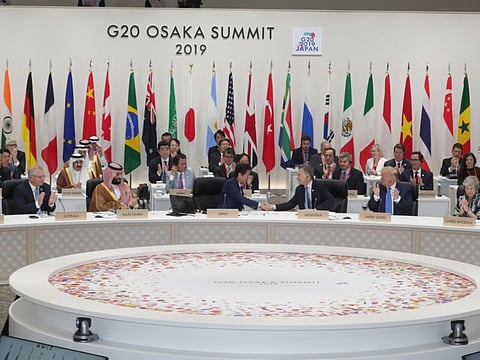G20 offers a positive sign for the global economy
Osaka summit welcomes China and the US talking on trade differences

For the past two years, the annual gatherings of the G20 group of international leaders have been dominated by differences over climate change and trade — and the most recent summit in Osaka, Japan, proved that nothing has changed. While it is called the G20, in fact it’s the gathering of 37 presidents, prime minister and heads of key intergovernmental organisations such as the International Monetary Fund.
The gathering was set against increasing concern over potential damage to the global economy if the current trade and tariff-fuelled feud between the United States and China escalates. Added to that is a growing sentiment in some G20 states where multilateral and international forums such as the G20 itself are responsible for job losses and an imbalance between the haves and have-nots.
The trade dispute between the US and China, respectively the world’s largest and second-largest economies, led to a number of countries indicating significant concerns about the fragility of global trade. Russian President Vladimir Putin, Indian Prime Minister Narendra Modi and European Commission President Jean-Claude Juncker all expressed concern at the likelihood of a slowdown should Presidents Donald Trump and Xi Jinping engage in a further round of punitive tariffs and countermeasures on goods traded between the two nations. As it was, both Trump and Xi indicated that their respective officials were continuing to talk, raising the prospect of a breakthrough.
The growing role of e-commerce across countries and continents came into focus, with a hope that World Trade Organisation rules might be reformed and updated to cover off significant holes in the current tariff and regulatory structures.
But the G20 isn’t just concerned about the regulatory framework of physically moving goods around the world. Innovation, the digital economy and artificial intelligence were also on the agenda during Friday’s key sessions. Prime Minister Shinzo Abe of Japan pushed for what he termed the “Osaka Track” for digital and AI governance, allowing electronic data to move freely across borders rather than being kept — or possible hoarded and open to abuses — in a single location.
French President Emmanuel Macron, whose nation recorded its hottest-ever temperatures on Friday, has been the group’s leading advocate in challenging Trump’s beliefs on climate change. Over the past two years, he has consistently pushed against any attempt by Trump administration officials to dilute climate-change language in the G20’s final communique. At Osaka, those differences continued.
So, was the summit a success? Yes, in that China and the US continued to negotiate on trade — and talking trumps tariffs every time.
Sign up for the Daily Briefing
Get the latest news and updates straight to your inbox



